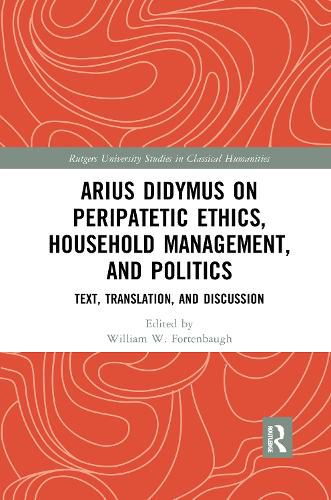Readings Newsletter
Become a Readings Member to make your shopping experience even easier.
Sign in or sign up for free!
You’re not far away from qualifying for FREE standard shipping within Australia
You’ve qualified for FREE standard shipping within Australia
The cart is loading…






This volume features a unique epitome (original summation) of Aristotelian practical philosophy. It is often attributed to Arius Didymus who composed a survey of Peripatetic thought on three closely related areas: ethics, household management, and politics. The quality of the epitome, which draws not only on the surviving treatises of Aristotle, but also on works by later Peripatetics, is excellent.
In recent years the epitome has attracted increased attention as an important document for the understanding of Hellenistic philosophy. This new edition of the Greek text is much needed; the most recent edition dates from 1884 and is seriously faulty. This translation, provided by Georgia Tsouni, is based on the oldest and best manuscripts and takes account of recent discussions of difficult passages. In addition, an English translation appears opposite the Greek text on facing pages. The text-translation is followed by nine essays, which are written for a wide audience-not only philosophers and classicists, but also scholars interested in politics and social order.
The essays also consider issues of a more philological nature: Who in fact was the author of the epitome? Is Theophrastus an important source? In discussing political matters, is the author intending to defend the practice of philosophy in Augustan Rome? Was there a second epitome, perhaps with a different slant, that has been lost?
$9.00 standard shipping within Australia
FREE standard shipping within Australia for orders over $100.00
Express & International shipping calculated at checkout
This volume features a unique epitome (original summation) of Aristotelian practical philosophy. It is often attributed to Arius Didymus who composed a survey of Peripatetic thought on three closely related areas: ethics, household management, and politics. The quality of the epitome, which draws not only on the surviving treatises of Aristotle, but also on works by later Peripatetics, is excellent.
In recent years the epitome has attracted increased attention as an important document for the understanding of Hellenistic philosophy. This new edition of the Greek text is much needed; the most recent edition dates from 1884 and is seriously faulty. This translation, provided by Georgia Tsouni, is based on the oldest and best manuscripts and takes account of recent discussions of difficult passages. In addition, an English translation appears opposite the Greek text on facing pages. The text-translation is followed by nine essays, which are written for a wide audience-not only philosophers and classicists, but also scholars interested in politics and social order.
The essays also consider issues of a more philological nature: Who in fact was the author of the epitome? Is Theophrastus an important source? In discussing political matters, is the author intending to defend the practice of philosophy in Augustan Rome? Was there a second epitome, perhaps with a different slant, that has been lost?